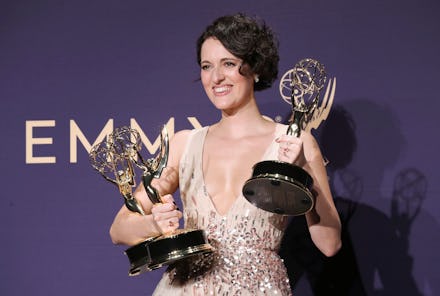'Fleabag' swept the Emmys because it perfectly reflects an uncertain generation

“They’re just getting on with it. Funny, clever women running the show,” Phoebe Waller-Bridge told the New York Times in an interview this past February. She was speaking of her characters—Killing Eve’s Villanelle and Eve, Crashing’s Lulu (the British one, not the Pete Holmes one), and Fleabag’s nameless lead. But she could easily be talking about herself. Waller-Bridge is one of those quiet storms, she almost snuck up on us. Now, she has three Emmys for writing, directing, and starring in Fleabag. In her awards speech at the Emmys last night, she cracked a joke, eschewing any cliched tearful messages of empowerment: “You know, I find writing really painful, but I’d like to say honestly, from the bottom of my heart, the reason I do it is this,” she said, shaking her award.
Fleabag began as a one-woman play put on by Waller-Bridge for the Edinburgh Festival Fringe Theater Festival in 2013. It was picked up by BBC (and made available on Amazon Prime for us non-Brits) for two seasons that knocked everyone’s socks off with its dark, acerbic wit and crisp take on modern life. Now, Fleabag is over; Waller-Bridge has said she’s simply moved on. But the impact of the series will surely last. Fleabag is a dynamite show because of its devastatingly sharp humor, the poignancy of its story (in season one, a newly single young woman who’s lost a friend to suicide and has a strained relationship with her family fills emotional voids with sex and food; season two: the same young woman lusts after a priest) and the high caliber acting. But it’s more the refreshing bluntness of Waller-Bridge’s writing, made even more acute by her character’s tendency to break the fourth wall and address the audience, like a Shakespearian fool, that makes Fleabag a loving slap in the face. It’s the fact that women characters like Waller-Bridge’s — full of desire, loathing, inner violence — hadn’t really existed on television until she put them there.
The show is jam-packed with impish, wordless jokes about the contradictions of womanhood. There are so many great one-liners about the expectations society places on women that it would be impossible to choose just one to sum it all up. (The quote, “I have a horrible feeling that I’m a greedy, perverted, selfish, apathetic, cynical, depraved, morally bankrupt woman who can’t even call herself a feminist,” said to her father in the pilot, comes pretty close.) Season two sees Fleabag fall head over heels for a priest; she becomes obsessed with the idea of what she can’t have. This time, she is self-destructive by way of the pursuit of disappointment. In a time when young people’s sex lives are constantly scrutinized, and we’re increasingly sucked into devices and social media and yet still consumed by desire, Fleabag feels real. It feels exactly right. Fleabag’s two seasons each garnered the coveted 100% Rotten Tomatoes score. The show has inspired what seems like universal acclaim, and the second season’s “Hot Priest” is a full-blown phenomenon. A manifestation of a generation’s shadowy craving for the unattainable.
Waller-Bridge has eye-rolled a little about being lumped into the feminist TV category. “Everything a comedian wants to be is funny. Attaching something political to someone whose art has nothing to do with politics is fucking unfair,” she told The Cut in 2017, after the first season of Fleabag hit Prime. “It’s like putting rocks in the pockets of somebody who’s just gone for a nice swim. They’re going to fucking drown! That’s why all women in the media sink eventually because they aren’t sinking, they’ve been drowned!”
The show’s intention may not have been to be feminist, per se, but there’s no shaking what Waller-Bridge has done for the medium, for the telling of women’s stories. Waller-Bridge and her show’s success at the Emmys this year proves it’s a watershed moment for these types of stories. Perhaps it’s the access streaming services allow, and an increasing openness for content that’s not white male-centric. Or perhaps it’s because Waller-Bridge is one of those once in a generation talents. In her acting, she is almost like a young Julia Louis-Dreyfus (who she beat for Outstanding Lead Actress last night), challenging archetypal portrayals of women with a filthy mouth that spews wisecracks about twats and rubbers and erections. The show manages to float somewhere above our current moment; ahead of its time in many ways (making its Emmy sweep all the more satisfying) but also, perfectly right now.